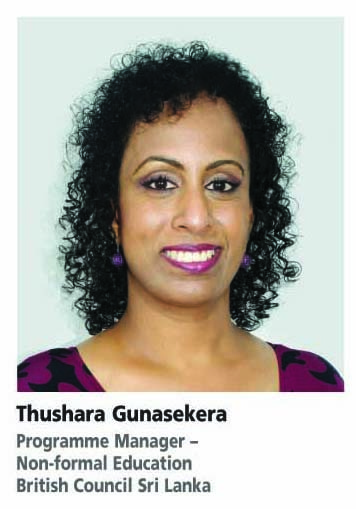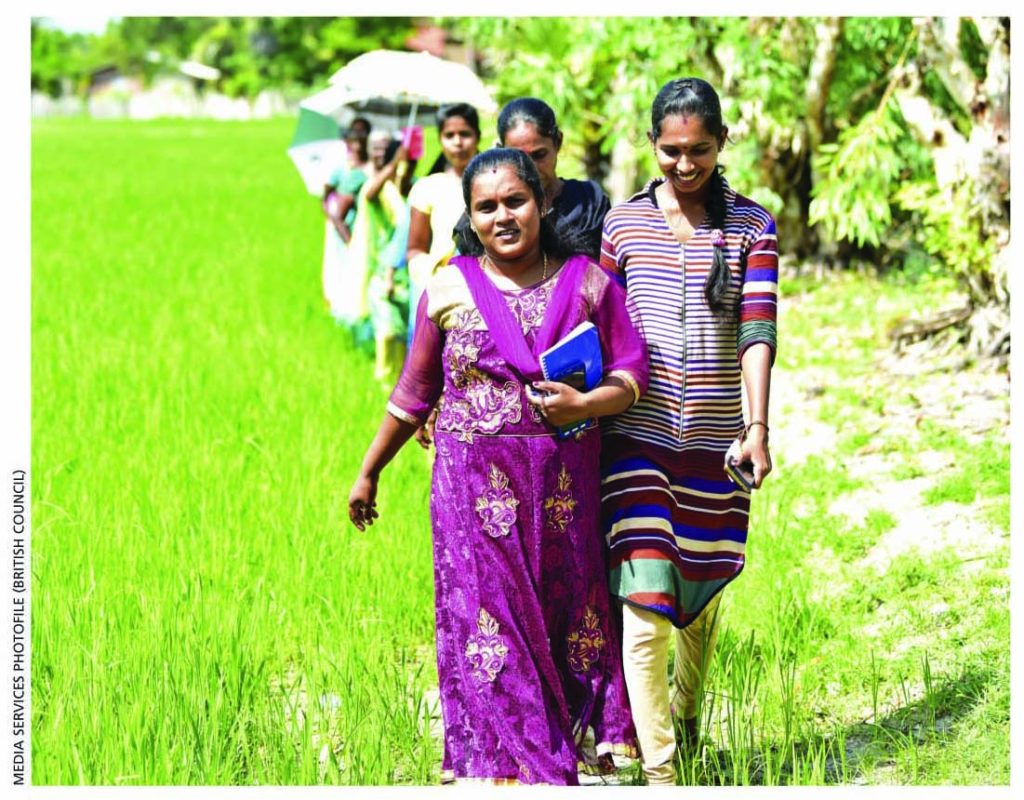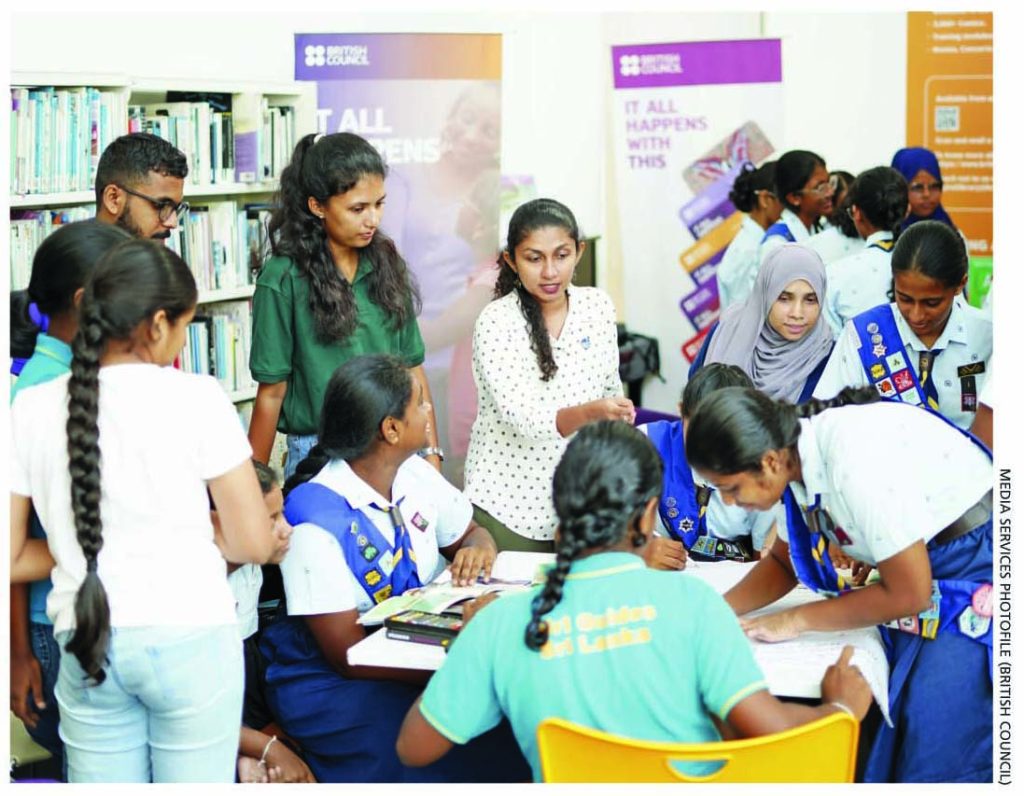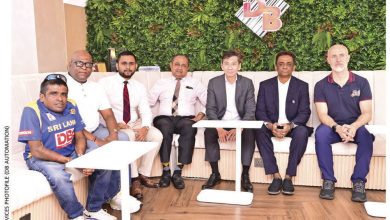BRITISH COUNCIL
A SYSTEMIC AND GLOBAL APPROACH TO UNLOCKING
THE POTENTIAL OF GIRLS AND YOUNG WOMEN THROUGH
SKILLS, CONFIDENCE AND COMMUNITY ENGAGEMENT

Q: How does the British Council integrate a systemic approach to advancing gender equality and girls’ empowerment across its education and skills programmes?
A: We adopt a systemic and intersectional approach to gender equality across all our education and skills programmes globally including in Sri Lanka.
Our frameworks align with the UN’s Sustainable Development Goal (SDG) 5, and we work across sectors to create enabling environments where girls and young women can thrive.
Through a theory of change focussed on increasing agency, expanding access, influencing policy, shifting social norms and fostering collaboration, our interventions go beyond participation to drive lasting structural change.
Q: What lessons from British Council’s global initiatives are most relevant to shaping gender transformative strategies in Sri Lanka?
A: Globally, our experience in over 100 countries has shown that long-term impact requires not only access to education but also cultural and institutional shifts.
From Sub-Saharan Africa to South Asia, we have learned the importance of engaging boys and men as allies, promoting female leadership and investing in life skills alongside technical training.
In Sri Lanka, these lessons have shaped our focus on gender responsive training, safe learning spaces and community engagement.
Q: How does the British Council ensure its programmes build not only technical or academic skills but confidence, voice and leadership among girls and young women?
A: Empowerment is not only about knowledge – it is about confidence, voice and agency.
Our programmes integrate soft skills development through mentorship, peer learning and experiential activities. For instance, our non-formal education (NFE) programmes – such as the Educating Girls for Climate Action project – which blend classroom based learning with community based climate action equip girls with skills in dialogue, project planning and leadership.
We are addressing climate communication literacy and leadership through our youth climate ambassadors (YCA) programme. Implemented in universities, YCA will use a gender inclusive workshop curriculum to promote green skills and digital upskilling while encouraging civic engagement. These platforms help girls and young women not only imagine but actively shape their futures.

Q: What role do families and communities play in the British Council’s work to empower girls in Sri Lanka? Could you share an example of successful local engagement?
A: Cultural expectations and social norms greatly influence the educational journeys of girls. That’s why we prioritise family and community involvement in our projects.
For instance, in our project Empowering Communities to Address Violence Against Women and Girls in the Eastern, Northern and Southern Province, we adapted the active citizens methodology to engage men, women and youth in identifying local issues and challenging harmful attitudes toward gender based violence.
Working in partnership with community based organisations, local leaders and women’s groups, we promoted inclusive, community wide participation through district level symposiums, workshops, awareness sessions, dialogues and grassroots projects targeting violence against women and girls.
Social media campaigns were also launched to engage men as allies in prevention efforts. At the same time, we focussed on strengthening local systems by enhancing support services and building the capacity of service providers to ensure long-term impact.
Q: How is the British Council supporting teachers and school leaders to adopt gender responsive teaching and create inclusive, safe spaces for girls?
A: There is considerable potential to scale up our work in Sri Lanka especially in underserved districts.
Digital learning platforms can reach remote learners and offer pathways for youth entrepreneurship. We are exploring initiatives focussed on climate resilience and digital innovation – sectors where girls can be key change agents, if equipped with the right tools and support.
The aim of these initiatives is to develop knowledge, skills and capacity as well as expand peer networks, encourage local advocacy and governance, and more feminist led climate networks.
They also strive to provide platforms and discussion forums with thematic experts on climate smart livelihoods and agriculture, as well as feminist leadership in the climate friendly energy sector.

Q: What barriers limit equal access or learning outcomes for girls? And how can the British Council support change?
A: Collaboration is central to our approach. We work in partnership with the Ministry of Education, the Central Environmental Authority (CEA), development agencies and the private sector to align efforts and drive systemic change. These partnerships ensure sustainability and scale.
Policy advocacy is also the need of the hour. We are looking at ways to partner with the government on climate policy – in particular, ensuring access to free skills for girls and the integration of green skills, such as addressing environmental challenges and promoting sustainability, into the school curriculum.
Additionally, we need to further strengthen civil society organisations to engage young girls in community based green skills projects.
Going forward, the British Council aims to build partnerships with the private sector to collaborate on digital platforms and technology access – ensuring that marginalised girls gain digital, technical and green skills for climate action.
– Compiled by Prashanthi Cooray
COMPANY DETAILS
Telephone 7521521/4521521 | Email info.lk@britishcouncil.org | Website www.britishcouncil.lk





